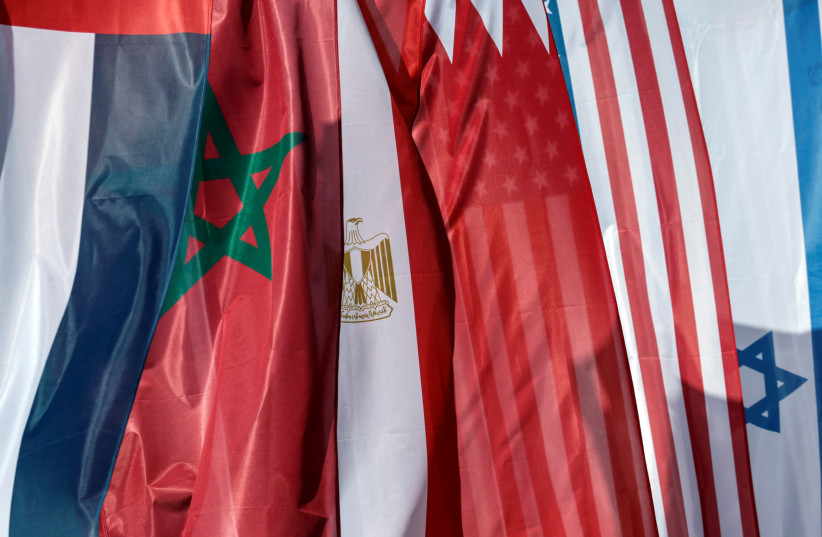The current tension on Temple Mount has probably been fomented by Iran. On Friday, April 15, clashes broke out on the Temple Mount between Israeli security forces and Palestinians who threw rocks at Jewish visitors to the Western Wall. The situation is especially volatile because of the overlap between the holy months of Ramadan and Passover. The press reported that a group of “violent youth” also threw firebombs from al-Aqsa, inadvertently causing a fire in the mosque.
The real reason for Iran’s intervention is the fear that the Negev Summit ignited in Tehran. From March 27-28, 2022, four Arab foreign ministers from the United Arab Emirates (UAE), Bahrain, Egypt and Morocco, and the US Secretary of State Antony Blinken participated in the Negev Summit in Sde Boker, Israel. The goal of the Negev Summit was to discuss further economic cooperation between the Israel and the Arab world and to build a new regional security architecture, a sort of “mini-NATO,” to counter Iran’s destabilizing actions in the region.
As a senior Israeli official put it, “The conference is a message to Iran that as it continues to spread chaos throughout the region, the response of those it is targeting will only become more united.” Israeli Foreign Minister Yair Lapid also said, “this new architecture, the shared capabilities we are building, intimidates and deters our common enemies, first and foremost Iran and its proxies.” Moroccan Foreign Minister Nasser Bourita further echoed that sentiment, saying that the summit represented a message to “those who are enemies of this positive dynamic... acting directly or through their proxi... that we are here to defend our values.”
It was pretty clear to Iran that this security alliance would limit its leverage in the region. The regime has harshly condemned the Negev Summit, calling the gathering “an evil meeting in the occupied territories” and a “betrayal of the cause of Palestine.”
The fear in Tehran is pretty reasonable; The Negev Summit can place a severe challenge to Iran’s regional plans. Though still in its infancy, creating a “Middle East NATO” (ME-NATO) puts Iran in its crosshair. Israel’s technological experience, including the anti-missile Iron Dome and anti-drone laser technology can bolster a regional defense system that would neutralize Iran’s advantages.

The ME-NATO can also threaten Iran’s long-term transition project from a territorial to a maritime state. The new security alliance makes it hard for the regime to use its navy for anti-access, area-denial (A2/AD) warfare against its adversaries.
Iran’s Foreign Minister Hossein Amir-Abdollahian warned the Arab countries against any normalization of relations with “the Zionist regime” and called the Negev Summit a threat to the security of the region.
Having established itself as a long-term defendant of the Palestinians, not to mention the patron of Hamas and the Palestinian Islamic Jihad (PIJ), the regime decided to use Ramadan as an excellent opportunity to destabilize the situation to trigger an Israeli response. The fact that Palestinians were not invited to the summit, not to mention their opposition to the Abraham Accords in the first place, made it easier for Iran to take advantage of the Palestinian anger.
The clash on the Temple Mount and the PIJ rocket fire was organized after a phone conversation between Ziyad al-Nakhalah, secretary-general of PIJ, and Ali Akbar Velayati, a senior foreign policy adviser to Ayatollah Khamenei, supreme leader of the Islamic regime in Tehran. In this conversation, Velayati urged al-Nakhalah “to foil the US and Israeli plots against the oppressed people of Palestine.”
The PIJ’s firing rockets at the southern Israeli city of Sderot on border settlements from the Gaza Strip aimed to trigger an Israeli response. Hamas, which is reluctant to start another war with Israel, has lost control of the PIJ units, but to save face, the terror group was compelled to threaten Israel. Hamas leader Ismail Haniyeh said, “Just as we defeated the flag march in Jerusalem, so too will we defeat the policy of breaking into al-Aqsa, and we are still at the outset of the campaign. If the occupation thinks invading al-Aqsa will change the Islamic character of the mosque, they are wrong.”
Hamas leaders know well that a new war with Israel would devastate the Gaza Strip and urge Israel to revoke the work permits of thousands of Palestinians, an essential economic lifeline to the Palestinians.
From the perspective of the Iranians, fanning the flames during Ramadan was a low-cost high-benefit response to the Negev Summit. The Arab participants in the conference were forced to condemn Israel and called to protect the Palestinians on the Temple Mount.
Iran, as always, would continue to undermine peace between Arabs and Israelis. The regime would also try to prevent the formation of the security alliance between these countries, not least because it would put Iran in its crosshair. Only with the solid support from the United States, and the firm resolves of the Arabs and Israelis can Iran’s malign activities be neutralized.
The writer is a senior research fellow at the Philos Project.
